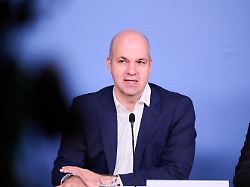Emigration Talk at Illner
Fratzscher: “That’s often scaremongering” by German companies
By Marko Schlichting
9/1/2023 4:44 am
Germany is headed for the next recession, the IFO business climate index is pointing down. Maybrit Illner wants to know from the guests of her talk show what can be done about it.
Somehow it’s not that bad after all. The warnings at the beginning of the first talk show after the summer break by Maybrit Illner on ZDF initially sound devastating. Okay, Germany is not yet facing the economic abyss, but the forecasts are bleak, according to the presenter. Germany is left behind when it comes to economic growth. Our economy is not growing, or to paraphrase Chancellor Olaf Scholz: “Growth is not as strong as we would like.” The traffic light coalition presented a ten-point plan during their retreat in Brandenburg this week on how they want to end the standstill, but will it really work? Illner wants to know that from her guests.
They don’t see the situation as negatively as the beginning of the show suggests. DIW boss Marcel Fratzscher, for example. He points out that the 2010s were a very successful decade for German industry. “German industrial companies have grown and have gained global market shares, we have created jobs, wages have risen.” At the same time, however, developments in the car industry, for example, have been overslept.
Fratzscher does not deny that industry has stopped growing. For him, this has to do with the fact that Germany is an export country. “The global economy is not running smoothly,” says Fratzscher. Economics expert Monica Grimm adds that Germany has successfully emerged from two crises: the corona and gas crises. The supply chains have suffered as a result of these crises. Now the current crises have to be tackled: infrastructure, the shortage of skilled workers, which is becoming a shortage of workers, and the geopolitical crisis caused, among other things, by the Ukraine war.
“Energy-intensive industry made us strong”
A weak growth is possible, says Grimm. “We have a very energy-intensive industry: that has made us strong, but it also means that we have a lot of transformation challenges because this energy-intensive industry now has to reinvent itself.” In addition, the shortage of skilled workers must be combated through improved immigration policies.
Fratzscher sees it similarly, but the DIW boss qualifies: “Economy has a lot to do with psychology and trust. Many companies do not invest if they do not have a certain basic trust that there is a certain perspective, that it is worth investing in invest.” And he criticizes: “We talk bad about each other.”
A problem of the German economy: the high energy prices. In order to keep particularly large industrial companies in Germany, the SPD and the Greens want to introduce a specially subsidized electricity price for these companies. It should be five cents per kilowatt hour. The FDP, otherwise known as the pro-business party, rejects the reduced industrial electricity price. She sees this as an injustice to the middle class and the citizens.
The deputy parliamentary leader of the SPD, Verena Hubertz, is in favor of it. The companies are currently making location decisions, she says. “We have to build a bridge for them so that they don’t migrate.” The industrial electricity price is not a solo for big industry, but a solo for “a targeted economic development where you otherwise close the shop”.
“It’s often scaremongering”
The Schleswig-Holstein Economics Minister Claus Ruhe Madsen, like the Union parties, is against an industrial electricity price. He is primarily committed to making energy cheaper where it is produced. “We want to motivate people to take part in the energy transition. We have to achieve this by giving them advantages.”
Grimm also finds an industry award problematic – and doubts that it is really important to produce as much as possible in Germany. Many products could be manufactured cheaper in other countries and then imported. As examples, she cites hydrogen, two thirds of which is to be imported by 2030, or ammonia.
Fratzscher doesn’t really rate the industrial electricity price positively either. He assumes that this will make electricity more expensive for small companies and private households and does not believe that many companies are willing to migrate. “It’s often scaremongering,” says Fratzscher.
Madsen not only wants to think about the companies that might leave Germany, but also create incentives for industries to come to Germany. To do this, many unnecessary laws and regulations would have to be abolished. “You have to go from one agency to another and at some point you feel like you’re a living email.” He laments: “We love being regulated. We demand laws for everything, and when we have them, we look for loopholes to circumvent them.”
